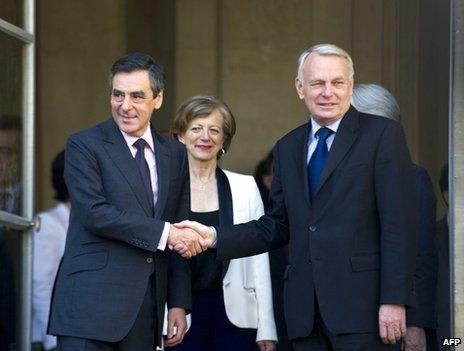French PM Jean-Marc Ayrault names new government
- Published

France's new Socialist Prime Minister Jean-Marc Ayrault has named his government, a day after Francois Hollande was inaugurated as president.
Hollande campaign chief Pierre Moscovici has been given the role of finance minister and former PM Laurent Fabius has been made foreign minister.
But, in a major development, party leader Martine Aubry turned down a post heading a "super ministry".
Sources said she saw "no point" in joining the cabinet if she was not PM.
Women's promise
Mr Ayrault, an old Hollande ally, said farewell to his predecessor, Francois Fillon, at the Matignon Palace on Wednesday morning but the make-up of his cabinet only became clear by evening.
News channel BFMTV reported that he had spent four hours during the afternoon discussing his team with President Hollande.
Although President Hollande had vowed women would make up half of the new cabinet, it soon became evident that few women had been given the top jobs. However, French media said that of the 34 ministerial posts, 17 had been given to women, including justice, culture, ecology and sport.
Christiane Taubira, an MP from French Guiana becomes justice minister. She is said to have turned down a post offered by President Sarkozy five years ago. Nicole Bricq is made ecology minister.
Marisol Touraine, 53, will head the social affairs ministry, having dealt with the brief during the election campaign. Aurelie Filippetti is made culture minister and Najat Vallaud-Belkacem, 34, is given the women's rights portfolio. Genevieve Fioraso will be in charge of higher education.
Friends and loyalists
Several posts have gone to close confidants of the new president. Jean-Yves Le Drian, council leader in the north-western region of Brittany, is given the defence portfolio; long-time Hollande loyalist Stephane Le Foll goes to agriculture; one-time prime ministerial spokesman Manuel Valls becomes interior minister.
Another of the major appointments is Vincent Peillon, a 51-year-old former philosophy professor and now an MEP, whose task will be to act on President Hollande's campaign pledge to create 60,000 jobs in schools over the next five years.
Michel Sapin, an experienced minister from the early 1990s and the Jospin government 10 years ago, is made labour minister.
Perhaps the most significant omission from the list is Ms Aubry, who was Mr Ayrault's main rival for the post of prime minister and had also challenged Mr Hollande for the presidential nomination.
Currently mayor of the northern city of Lille, she has led the Socialist Party since 2008 and played a key role in the government of Lionel Jospin, from 1997-2002. As labour minister she introduced the 35-hour working week.
Although she had been linked to several ministerial positions, there was speculation that she was being lined up for a role in charge of education, culture and youth policy.
Ms Aubry said that for the moment she would stay on as Socialist leader. "I worked flat out for Francois Hollande's victory, and I'll do it again in the fight for the parliamentary elections."
Like Mr Hollande himself, the new prime minister has never previously held a ministerial post but is mayor of the western city of Nantes, and a veteran MP with a reputation for building consensus.